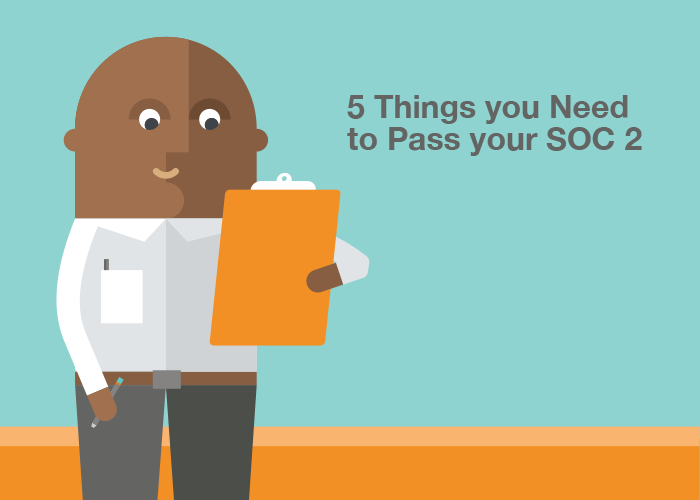
How should you prepare for passing your SOC 2 audit?
The pressure is on as more and more service providers and service organizations are being asked by clients for a SOC 2 audit report. Are you prepared to demonstrate your commitment to security and privacy to your clients and prospects? Here are 5 things you need to pass your SOC 2 audit.
1. Annual Risk Assessment
Three questions you should ask yourself at least once a year are, have I identified potential threats to my organization? Have I analyzed the significance of the risks associated with each threat? What are my mitigation strategies for addressing these risks? In answering these questions, you will have performed a Risk Assessment, the foundation for any successful information security program. After all, how can you protect your organization from threats if you don’t know what those threats are? Utilizing a Risk Assessment Guide can help get you started with the process if this is your first time.
2. Annual Policy and Procedure Review
Annual policy and procedure review is the best way to make sure that there are no gaps in your security posture in preparation for your SOC 2 audit. It also helps when determining that you’ve properly documented everything you say you’re doing and that it is being communicated to any, and all, relevant personnel. As far as your auditor is concerned, if it isn’t documented, it’s not happening. Annually reviewing your policies and procedures is a good way to continuously mature your environment while ensuring due diligence in preparation for your SOC 2 audit.
3. Fully Developed Security Awareness Employee Training Program
Did you know you’re only as strong as your weakest link? Annual security awareness training programs are important to make sure all personnel, from IT to operations, have knowledge of security awareness and are taking steps to protect your organizational assets from breach. Security awareness training is an important aspect of SOC 2 compliance, and a necessary component for any information security management program.
4. Vendor Management Procedures
Vendor management is a must when it comes to ensuring that your vendors are complying with information security best practices and standards. Vendors present risk to every organization, so in order to properly prepare for your SOC 2 compliance audit, you must regularly and thoroughly vet your vendors, and document the procedures for managing your vendors.
5. Incident Response and BCDRP
Lastly, any organization preparing for their SOC 2 audit must develop and test their Incident Response Plan and Business Continuity Disaster Recovery Plan. Has it been mapped? Planned? Tested? The purpose of incident response planning is to know how to react and the steps you must take in the event of a breach in order to minimize damage and risk to your organization and business operations. Once your organization has accomplished these things, you’re ready to begin your SOC 2 audit process.
Get Help Preparing for Your SOC 2 Audit
If you’ve successfully prepared these things, and you’re ready to engage a third-party auditing firm in your SOC 2 audit.
Sarah Morris is a guest blogger for our audit partner, KirkpatrickPrice. The original blog post may be found here. Contact Sarah at [email protected].

